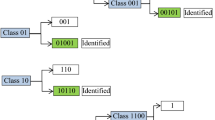Abstract
Radio frequency identification (RFID) technology is a kind of non-contact identification technology, which has been widely applied in logistics management, access control system and other fields. However, when multiple tags response the RFID reader simultaneously, the superposition of signals will deduce reader’s incorrect reception, which is called collision. Dynamic frame slotted ALOHA (DFSA) algorithm is a effective anti-collision algorithm in RFID system, but its’ high system efficiency relies on the reliability of the tags’ number estimation. Some researches propose a frame break policy for ALOHA-based RFID system, which breaks the frame early when judging that the current frame length is not appropriate through slot-by-slot estimation of number of tags and is called SbS-DFSA. Here, we find some improvement space of SbS-DFSA, and make it more efficient by modifying some details. The simulation shows that our modification is efficient and improves the performance practically.
This work was supported in part by the Guangdong Provincial Special Fund For Modern Agriculture Industry Technology Innovation Teams under Grant 2020KJ122, in part by the Collaborative Education Project of Industry University Cooperation (No.201802016050), in part by the State’s Key Project of Research and Development Plan under Grants 2019YFE0196400, in part by the NSFC under Grant 61771495, and in part by the Guangdong R&D Project in Key Areas under Grant 2019B010158001.
Access this chapter
Tax calculation will be finalised at checkout
Purchases are for personal use only
Similar content being viewed by others
References
Hush, D.R., Wood, C.: Analysis of tree algorithms for RFID arbitration. In: The IEEE International Symposium on Information Theory, Mexico City, USA, p. 107 (1998)
Myung, J., Lee, W.: Adaptive binary splitting: a RFID tag collision arbitration protocol for tag identification. In: IEEE BROADNETs, Boston, MA, USA, pp. 347–355 (2005)
Myung, J., Lee, W., Srivastava, J.: Adaptive binary splitting for efficient RFID tag anti-collision. IEEE Pers. Commun. 10(3), 144–146 (2006)
Law, C., Lee, K., Siu, K.-Y.: Efficient memoryless protocol for tag identification (extended abstract). In: Proceedings of the 4th International Workshop on Discrete Algorithms and Methods for Mobile Computing and Communications, Toronto, CA, pp. 75–84 (2000)
Finkenzeller, K.: RFID Handbook: Fundamentals and Applications in Contactless Smart Cards and Identification, 2nd edn. John Wiley and Sons Ltd., Hoboken (2003)
Solic, P., Radic, J., Rozic, N.: Early frame break policy for ALOHA-based RFID systems. IEEE Trans. Autom. Sci. Eng. 13(2), 1–6 (2015)
Bo, F., Jin-Tao, L., Jun-Bo, G., Zhen-Hua, D.: ID-binary tree stack anticollision algorithm for RFID. In: Proceedings of 11th IEEE Symposium on Computers and Communications, Sardinia, Italy, pp. 207–212 (2006)
Jacomet, M., Ehrsam, A., Gehrig, U.: Contact-less identification device with anti-collision algorithm. In: Conference on Circuits Systems, Computers and Communications, Athens, Greece (1999)
Kim, S.H., Shin, M.K., Park P.: A new tree-based tag anticollision protocol for RFID systems. In: International Conference on Communications in Computing, Nevada, pp. 83–86 (2006)
Schwartz, M.: Telecommunication Networks Protocols, Modeling and Analysis. Addison-Wesley, Boston (1988)
Zhen, B., Kobayashi, M., Shimizu, M.: Framed ALOHA for multiple RFID objects identification. IEICE-Trans. Commun. E88–B, 991–999 (2005)
Vogt, H.: Multiple object identification with passive RFID tags. In: The IEEE International Conference on Systems, Man and Cybernetics, Tunisia, pp. 6–13 (2002)
Vogt, H.: Efficient object identification with passive RFID tags. In: IEEE PerCom, TX, USA (2002)
Knerr, B., Holzer, M., Angerer, C., Rupp, M.: Slot-wise maximum likelihood estimation of the tag population size in FSA protocols. IEEE Trans. Commun. 58(2), 578–585 (2010)
Šolić, P., Radić, J., Rožić, N.: Algorithm for deriving optimal frame size in passive RFID UHF class1-gen2 standard using combinatorial model boundaries. AUTOMATIKA 51, 255–263 (2010)
Solic, P., et al.: Improved linearized combinatorial model (ILCM) for optimal frame size selection in ALOHA-based RFID systems radio. In: Proceedings of the IEEE International Conference on Communications Workshops (ICC), Budapest, Hungary, pp. 1092–1097 (2013)
Chen, W.-T.: An accurate tag estimate method for improving the performance of an RFID anticollision algorithm based on dynamic frame length ALOHA. IEEE Trans. Autom. Sci. Eng. 6(1), 9–15 (2009)
EPCglobalInc.: EPC Radio-Frequency Identity Protocols Generation-2 UHF RFID. EPCglobal (2015)
Knerr, B., Holzer, M., Angerer, C., Rupp, M.: Slot-wise maximum likelihood estimation of the tag population size in FSA protocols. IEEE Trans. Commun. 58(2), 578–585 (2010)
Author information
Authors and Affiliations
Corresponding author
Editor information
Editors and Affiliations
Rights and permissions
Copyright information
© 2021 ICST Institute for Computer Sciences, Social Informatics and Telecommunications Engineering
About this paper
Cite this paper
Zeng, X., Qiu, J., Wang, X., Chen, X. (2021). Enhanced Frame Break Mechanism for ALOHA-Based RFID Anti-Collision Algorithm. In: Li, B., Li, C., Yang, M., Yan, Z., Zheng, J. (eds) IoT as a Service. IoTaaS 2020. Lecture Notes of the Institute for Computer Sciences, Social Informatics and Telecommunications Engineering, vol 346. Springer, Cham. https://doi.org/10.1007/978-3-030-67514-1_18
Download citation
DOI: https://doi.org/10.1007/978-3-030-67514-1_18
Published:
Publisher Name: Springer, Cham
Print ISBN: 978-3-030-67513-4
Online ISBN: 978-3-030-67514-1
eBook Packages: Computer ScienceComputer Science (R0)




